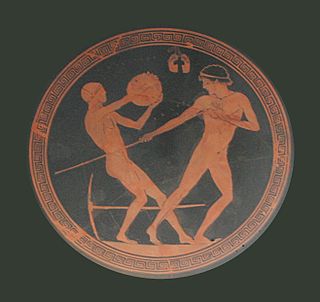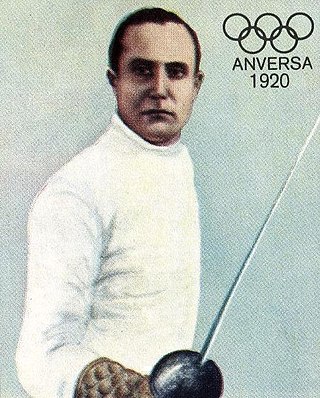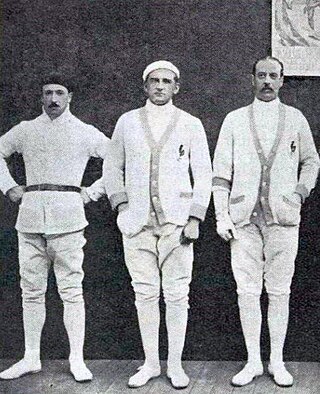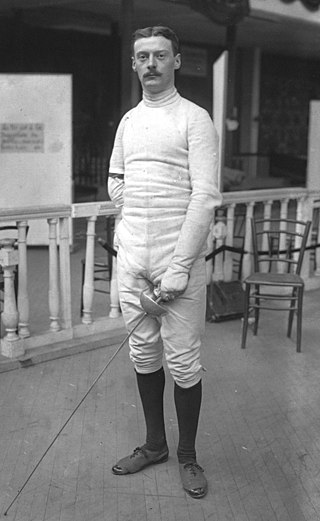
The 1920 Summer Olympics, officially known as the Games of the VII Olympiad and commonly known as Antwerp 1920, were an international multi-sport event held in 1920 in Antwerp, Belgium.

A pentathlon is a contest featuring five events. The name is derived from Greek: combining the words pente (five) and -athlon (competition). The first pentathlon was documented in Ancient Greece and was part of the Ancient Olympic Games. Five events were contested over one day for the Ancient Olympic pentathlon, starting with the long jump, javelin throwing, and discus throwing, followed by the stadion and wrestling. Pentathletes were considered to be among the most skilled athletes, and their training was often part of military service—each of the five events in the pentathlon was thought to be useful in war or battle.

Edoardo Mangiarotti was an Italian fencer. He won a total of 39 Olympic titles and World championships, more than any other fencer in the history of the sport. His Olympic medals include one individual gold, five team golds, five silver, and two bronze medals from 1936 to 1960, making him the most decorated Italian Olympian of all time and tied for the tenth-most decorated Olympian of all time.

France competed at the 1920 Summer Olympics in Antwerp, Belgium. 304 competitors, 296 men and 8 women, took part in 113 events in 23 sports.

Paul Eugène Albert Anspach was a Belgian épée and foil fencer who competed in four consecutive Olympics.
The World Fencing Championships is an annual competition in fencing organized by the International Fencing Federation. Contestants may participate in foil, épée, and sabre events.

The men's sabre was a competition in fencing at the 2004 Summer Olympics in Athens. A total of 39 men from 21 nations competed in this event. Nations had been limited to three fencers each since 1928. Competition took place in the Fencing Hall at the Helliniko Olympic Complex on August 14. The event was won by Aldo Montano of Italy, the nation's first victory in the men's sabre since 1920. Montano accomplished what his grandfather and father, both world champions in the individual event and Olympic medalists in the team competition, had not been able to: Olympic gold in the individual event. Zsolt Nemcsik of Hungary took silver while Vladislav Tretiak earned Ukraine's first medal in the event with his bronze. France's five-Games medal streak ended.

The men's foil was a fencing event held as part of the Fencing at the 1920 Summer Olympics programme. It was the fifth appearance of the event. A total of 56 fencers from 10 nations competed in the event, which was held on August 17 and August 18, 1920. Nations were limited to eight fencers each, with Belgium and Italy entering the maximum. Nedo Nadi of Italy repeated as Olympic champion, retaining the title he initially won at the 1912 Summer Olympics. Philippe Cattiau and Roger Ducret of France earned silver and bronze, respectively, returning France to the podium for the first time since 1900.

The men's épée was a fencing event held as part of the fencing at the 1920 Summer Olympics programme. It was the fifth appearance of the event. A total of 80 fencers from 13 nations competed in the event, which was held from August 20 to 23, 1920. Each nation was limited to eight fencers, down from 12 in 1908 and 1912. Of the six fencing events, the only one in which Nedo Nadi did not win a gold medal was the one in which he did not compete. Instead, a trio of Frenchmen swept the medals. It was Lippmann's second silver medal in the event, he having previously taken second in 1908; he was the second man to win multiple medals in the individual épée.
The men's team épée was a fencing event held as part of the Fencing at the 1920 Summer Olympics programme. It was the third appearance of the event. Eleven nations competed.

The men's sabre was a fencing event held as part of the Fencing at the 1920 Summer Olympics programme. It was the sixth appearance of the event. A total of 43 fencers from 9 nations competed in the event, which was held on August 25 and August 26, 1920. Nations were limited to eight fencers each. The event was won by Nedo Nadi of Italy, one of his five gold medals in 1920. His brother Aldo Nadi took silver. Adrianus de Jong of the Netherlands finished third. They were the first medals in the individual men's sabre for both countries. This was the only time from 1908 to 1964 that Hungary did not win the men's sabre—with no Hungarian fencers competing after the nation was disinvited after World War I.
The men's team sabre was a fencing event held as part of the Fencing at the 1920 Summer Olympics programme. It was the third appearance of the event.

The men's foil was one of seven fencing events on the Fencing at the 1924 Summer Olympics programme. It was the sixth appearance of the event, which had not been on the programme in 1908. The competition was held from Monday July 1, 1924, to Thursday July 4, 1924. 49 fencers from 17 nations competed. Nations were limited to four fencers each, down from eight in 1920. The event was won by Roger Ducret of France, the nation's third victory in the men's foil. His countryman Philippe Cattiau finished second for the second consecutive Games; Cattiau and Ducret became the second and third men to win multiple medals in the event. Maurice Van Damme earned Belgium's first medal in the men's foil with his bronze.
The men's épée was one of seven fencing events on the Fencing at the 1924 Summer Olympics programme. It was the sixth appearance of the event, which had not been on the programme in 1896. The competition was held from Wednesday, July 10, 1924 to Thursday, July 11, 1924. 67 fencers from 18 nations competed. Nations were limited to four competitors each. The event was won by Charles Delporte of Belgium, the nation's second victory in the individual épée. Silver went to Roger Ducret of France. Nils Hellsten earned Sweden's first medal in the event with his bronze.

The men's sabre was one of seven fencing events on the Fencing at the 1924 Summer Olympics programme. It was the seventh appearance of the event, the only fencing event to have been on the programme at every Games. The competition was held from Tuesday July 16, 1924 to Thursday July 18, 1924. 47 fencers from 15 nations competed. Nations were limited to four fencers each, down from eight in 1920. The event was won by Sándor Pósta of Hungary, beginning a nine-Games streak in which Hungarians won the gold medal in the men's sabre. Roger Ducret of France took silver, while another Hungarian, János Garay, earned bronze.

The men's épée was one of seven fencing events on the Fencing at the 1928 Summer Olympics programme. It was the seventh appearance of the event. The competition was held from 6 August 1928 to 7 August 1928. 59 fencers from 22 nations competed. Each nation could have up to three fencers. The event was won by Lucien Gaudin of France, the nation's third victory in the individual men's épée—taking sole possession of most among nations above Cuba and Belgium, each at two. Gaudin was the second man to win both the foil and épée events at a single Games. It was the third consecutive Games at which France reached the podium in the event. Two Frenchman had reached the head-to-head final; Gaudin won over Georges Buchard, who received silver. Bronze in 1928 went to American George Calnan, the nation's first medal in the event.

The men's foil was one of seven fencing events on the Fencing at the 1928 Summer Olympics programme. It was the seventh appearance of the event. The competition was held from 31 July 1928 to 1 August 1928. 54 fencers from 22 nations competed. For the third straight Games, the limit of fencers per nation was reduced. The event was won by Lucien Gaudin of France, the nation's second consecutive and fourth overall victory in the men's foil. Erwin Casmir earned silver to give Germany its first medal in the event. Giulio Gaudini of Italy took bronze.

The men's sabre was one of seven fencing events on the Fencing at the 1928 Summer Olympics programme. It was the eighth appearance of the event. The competition was held from 10 August 1928 to 11 August 1928. 44 fencers from 17 nations competed. For the third straight Games, the limit of fencers per nation was reduced. The event was won by Ödön von Tersztyánszky of Hungary, the second in a nine-Games streak of Hungarian wins. Attila Petschauer, also of Hungary, took silver. Italy's Bino Bini earned bronze.

The men's foil was one of seven fencing events on the fencing at the 1932 Summer Olympics programme. It was the eighth appearance of the event. The competition was held from 2 to 4 August 1932. 26 fencers from 12 nations competed, with one other entered but not starting. Each nation was limited to three fencers. The event was won by Gustavo Marzi of Italy, the nation's third victory in the men's foil. His countryman Giulio Gaudini took bronze for the second consecutive Games, becoming the fourth man to win multiple medals in the event. Joe Levis gave the United States its first men's foil medal with his silver.

The men's team foil event at the 2020 Summer Olympics took place on 1 August 2021 at the Makuhari Messe. 27 fencers from 9 nations are expected to compete.















